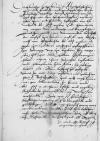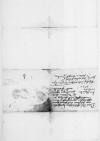 GStA, PK, HBA, C 2, No 87, f. 1r
GStA, PK, HBA, C 2, No 87, f. 1r
Durchlauchter(r), hochgeborner(r) furst, hochgelybther(r) herr(r) und freundt / und genedyger her. Unser freuntliche, wyllige dinst zuvoran. /
Uns sein dyse thage / von dem hochwirdigsten, / unserm(m) lyben hern(n) und freundt / ⌊byschoffen von Ermelandt⌋ ⌊ko(niglicher) m(aieste)t⌋, unsers al(lergnedigsten) hern(n), brive von wegen des contracts(s) mit ⌊konniglicher(r) erwelther(r) wirdt / von Dennemarcken⌋ botschafftter / vorfast zcw komen(n). / Und written over s⌈sdd written over s⌉ so wir dyssmalh von hochgedachter ⌊ko(niglicher) m(aieste)t⌋, unserm al(lergnedigsten) hern, / zw andren wichtigen geschefften(n) gen ⌊Dantzig⌋ uns zw begeben ihm wege / sein, / hab wir dem edlen, gestrengen(n) hern(n) ⌊Achacio Cheme⌋, dantzker castellan(n) und hawptman zum ⌊Stume⌋, / dy selbige bryve mit allem befhelh zw geschickt, / domit her mit dem erstenn(n) / mit gedachten hern botschaffter(r) / zceit und written over ...⌈... illegible⌈...... illegible⌉dd written over ...⌉ mass benueme, / gen ⌊Marienburg⌋ zu komen(n) und ko(nigliche) m(aieste)t, u(nseren) al(lergnedigsten) hern(n), / befelhe und wyllen(n) nachstellende zcum ende, / wy vorlassen, vorhandle, / das wir so freuntlicher(r), dinstlicher(r) meÿnung E(wer) F(urstliche) G(naden), der gesunde und gluckselige ankunfft / wÿ hertzlich gerne vornomen(n) und uns der selben gunst thun befelhen(n), nicht haben wollt stain⌈[lt]lt stain⌉ vorhalthen. /
 GStA, PK, HBA, C 2, No 87, f. 1v
GStA, PK, HBA, C 2, No 87, f. 1v  GStA, PK, HBA, C 2, No 87, f. 1r
GStA, PK, HBA, C 2, No 87, f. 1r 
